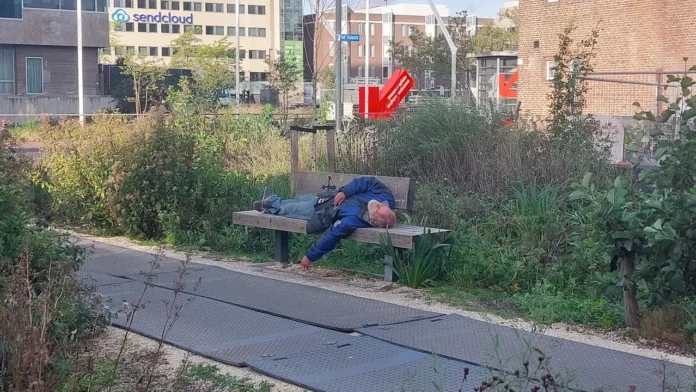Eindhoven has seen an increase in the number of homeless people in recent years. The fact that more and more people are sleeping on the streets is visible in the city.
Journalists Lennard Vader and Jasper Piron therefore went on an investigation. For the podcast series ‘Homeless in the City of Light’ they spoke to ex-homeless people, supervisors and policy makers. “Only when the letters turn dark purple do people feel the need to take action.”
The fourth episode of the six-part podcast can be heard on the studio040 website. In this episode, the makers investigate how assistance for the homeless is organised in Eindhoven.
Accompaniment
Jelle van Kruijssen and Sophie Floor both work as supervisors at Stichting Springplank. They explain what happens when homeless people approach the aid agency. “A person is referred by a homeless shelter or via the municipality. This is followed by a conversation. It must then become clear what the person needs,” Van Kruijssen explains. According to supervisor side, what a first meeting looks like differs per candidate.
“On the one hand, you want to hear the whole story, and on the other hand, you want to give the candidate peace and space, knowing that they have been through a lot.” It is really a puzzle to solve, Van Kruijssen adds. “There is not a specific manual for everyone, and each candidate has different needs.”
Listening ear
In Eindhoven, there are several places where homeless people can go, even if it is not about direct assistance. One such place is drop-in centre ‘t Hemeltje, where accessibility is important. Homeless people can shower, eat and use the toilet here. Volunteer Nancy Ornek explains how she and her colleagues also fulfil a service-oriented role. “We observe and maintain contact with other aid organisations, but are also there for the target group, as a listening ear or shoulder to cry on.”
Tipping point
Jep Verhorevoort, coordinator at Werkplaats Financiën, also regularly sees homeless people knocking on their door with a request for help. “We help to map out a financial situation or to draw up a plan of action. Often that is too late: only when the letters on the doormat turn dark purple do people feel the need to take action.”
Naomi, a candidate at Springplank, indicates that she only felt this need at a described low point: the moment she ended up on the street. “Only then did I feel the urgency to do something about it. If I had never come to that realisation, my current situation would have been very different. Sometimes someone has to hit rock bottom to understand that something needs to give.”
Source: Studio040
Translated by Yawar Abbas
















